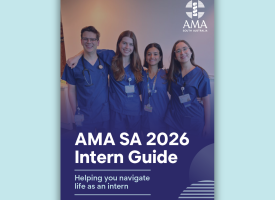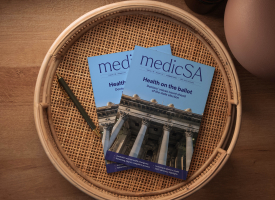Transcript: ABC Radio Adelaide - Whooping cough
More than 1,000 cases of whooping cough have been recorded in South Australia since 1 January 2025, almost 11 times the number of cases at this time last year. AMA SA President Dr John Williams told ABC Radio Adelaide that vaccine hesitancy is contributing to the high number of infections.

Transcript: AMA SA President Dr John Williams on ABC Radio Adelaide with Rory McClaren.
(24 April, 2025)
Subjects: whooping cough, immunisation, vaccine hesitancy, herd immunity, general practice
Rory McClaren: John, to start with, what have you seen coming through your practice in recent months when it comes to whooping cough?
Dr John Williams: I personally haven't seen any patients with whooping cough, which is good. But I do understand the state and national figures are extremely concerning. And really, again, to reinforce that, it is a preventable disease for those that are vaccinated, but also, as was mentioned, the cocooning effect or the herd immunity that protects those that can't, the infants that can't be immunised or aren't covered by the immunisation until a little bit later. So protecting those people around them so that the whooping cough isn't passed on to them. And having, as a young GP, on a paediatric ward seeing an infant with whooping cough, it is extremely disturbing to see an infant just coughing their life out of them and being potentially impacted for the rest of their life by a preventable disease. So really, I'll just speak on behalf of all the other health professionals that have seen the negative impacts of this disease and how really having the immunisation can save lives. We can't lose sight of that fact. And also it saves potential disability as well, apart from just the inconvenience of having the 90-day cough.
Rory McClaren: Just on that, John, once someone has been diagnosed with having whooping cough, how can it be treated and how important is it to start treatment quickly?
Dr John Williams: It depends. So I guess that's a really good message. If you do suspect or are worried about it, go and see your GP and they can test you for it and then determine whether treatment is needed. Antibiotics can reduce the transmission, but it depends on the stage of the illness you’re at.
Rory McClaren: The issue of waning vaccine mandates is potentially contributing to the amount of the disease we are seeing in the community. Does the AMA have concerns about vaccine hesitancy? Are you worried that vaccine hesitancy could be contributing to the current caseload of whooping cough?
Dr John Williams: Absolutely. The AMA and all doctors are extremely concerned about vaccine hesitancy and the mistrust of something we have strong evidence for, which we know saves lives and prevents disability. I've had the privilege of working in countries less privileged than ours with vaccination programs. For the population in those countries, Australia is the envy due to our broad-reaching and highly effective program. We live in a charmed world with immunisations available to prevent these illnesses. It's of great concern, and we shouldn't lose sight of the fact that vaccinating saves lives.
Rory McClaren: John has called. Good morning to you, John.
(Caller): Morning, Rory. Morning, Dr. Williams. When I was at school in the 1950s in country towns, we were all vaccinated at school. The local doctor and nurse would come around, and we all had immunisations for tetanus, diphtheria, and whooping cough. Is that happening today? If not, why not?
Rory McClaren: Thank you, John. Back to you, Dr. John Williams.
Dr John Williams: Yes, there is an extremely strong vaccination program. Most of it starts in early childhood but continues into school years as well. Many of my elderly patients tell me about growing up in the early days of immunisation, where illnesses like polio were often fatal or left friends disabled. They saw the impact of these illnesses around them. I think we've lost touch with that. We are protected by our excellent immunisation program in Australia.



